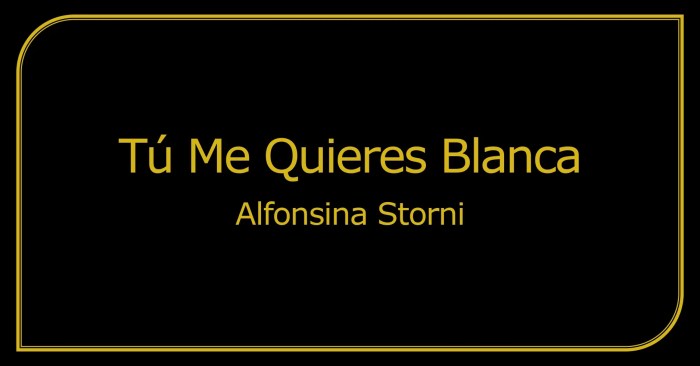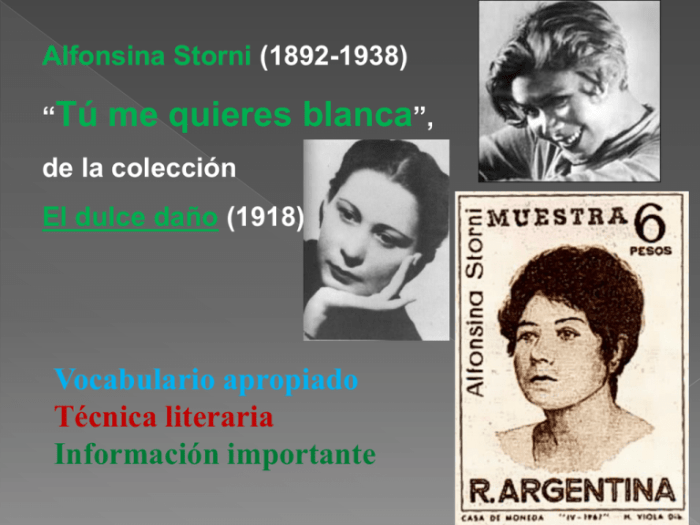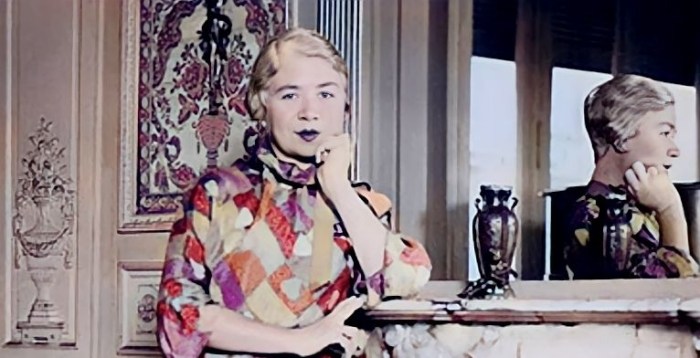Tu me quieres blanca english – Embark on a captivating journey into the enigmatic phrase “Tu Me Quieres Blanca” in English, where cultural nuances intertwine with linguistic subtleties, revealing a profound reflection of societal norms and values.
This exploration delves into the phrase’s historical origins, cultural significance, and modern interpretations, shedding light on its multifaceted nature and the enduring impact it has had on shaping cultural identity.
Historical Context

The phrase “Tu me quieres blanca” has a long and complex history, with its origins in the Spanish colonization of the Americas. During this period, Spanish colonists imposed their own cultural and linguistic norms on the indigenous population, including the expectation that women should be white-skinned and chaste.
The Phrase in Literature and Art
The phrase “Tu me quieres blanca” has been used in a variety of literary and artistic works to explore themes of race, gender, and identity. One of the most famous examples is the poem of the same name by Afro-Cuban poet Nicolás Guillén.
The famous “Tu me quieres blanca” song has been sung by many artists over the years. It’s a beautiful and haunting melody that has captivated audiences worldwide. For those who appreciate the art of writing, I highly recommend checking out the writer by richard wilbur . This poem explores the complexities of the writing process and the challenges faced by those who strive to create something truly meaningful.
While the poem and the song are different in nature, they both share a common thread of artistic expression. Whether you’re a fan of music or literature, I encourage you to explore both of these works and appreciate the beauty they have to offer.
In this poem, Guillén uses the phrase to critique the racism and sexism that he witnessed in Cuban society.
Cultural Significance

The phrase “Tú me quieres blanca” has played a significant role in shaping cultural identity in various Spanish-speaking countries. It embodies societal norms and values, particularly regarding gender roles and beauty standards.
Societal Norms and Values, Tu me quieres blanca english
- Gender Roles:The phrase reinforces traditional gender roles, where women are expected to conform to a certain standard of beauty, often associated with fairness and purity.
- Beauty Standards:It reflects the societal preference for fair skin, which has been historically associated with wealth, status, and desirability.
Controversies and Debates
The phrase has also sparked controversies and debates:
- Racism and Colorism:Critics argue that it perpetuates racist and colorist ideologies, promoting a Eurocentric beauty ideal that devalues darker skin tones.
- Cultural Identity:Some individuals and groups have reclaimed the phrase as a symbol of cultural resistance, challenging societal norms and embracing their own cultural identities.
Modern Interpretations

The phrase “Tu me quieres blanca” continues to be used in contemporary society, but its meaning and usage have evolved over time. In modern contexts, the phrase is often interpreted as a commentary on societal expectations and beauty standards.
In many cultures, there is a preference for fair skin, which has historically been associated with wealth, status, and beauty. The phrase “Tu me quieres blanca” can be seen as a critique of this preference, suggesting that people are only valued if they conform to certain physical ideals.
Popular Culture
The phrase has also been used in popular culture to explore themes of identity, race, and self-acceptance. For example, the song “Tu Me Quieres Blanca” by the Mexican singer Lila Downs examines the complex relationship between beauty standards and cultural identity.
Comparative Analysis: Tu Me Quieres Blanca English

The phrase “Tu me quieres blanca” has several equivalents in other languages, each with its own cultural and linguistic nuances.
In Spanish, the phrase “te quiero” is commonly used to express affection, but it can also have romantic connotations. The addition of “blanca” (white) in “Tu me quieres blanca” adds a layer of purity and innocence to the sentiment.
English
The closest equivalent in English is “You want me pure.” However, this translation lacks the emotional depth and cultural context of the original Spanish phrase.
French
In French, the phrase “Tu me veux pure” is similar in meaning to “Tu me quieres blanca,” but it carries a stronger connotation of desire and possession.
German
The German phrase “Du willst mich rein” is a more literal translation of “Tu me quieres blanca,” but it loses the poetic and romantic overtones of the Spanish original.
Universal Themes
Despite these cultural and linguistic differences, all of these phrases share a common theme of desire for purity and innocence in a romantic relationship.
Essential Questionnaire
What is the literal meaning of “Tu Me Quieres Blanca” in English?
It translates to “You Want Me White.”
How has the phrase been used in literature?
It has appeared in works by authors such as Federico García Lorca and Isabel Allende, often exploring themes of cultural assimilation and the search for identity.
What controversies have surrounded the phrase?
Some critics have argued that it perpetuates harmful stereotypes about race and beauty, while others defend its use as a reflection of cultural diversity.
